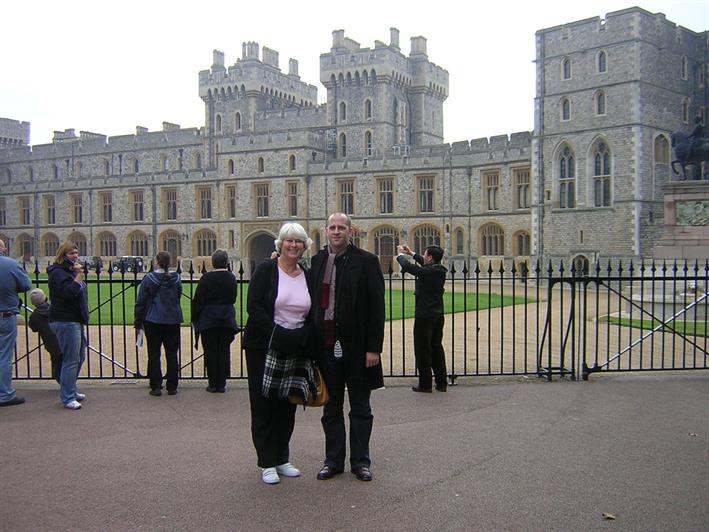
Image: Professor Chris Lord and his mum, Janice
As a woman today, it is easy to take for granted some aspects of working life, such as paid maternity leave and flexible working, which mean planning to have a family is not always the barrier to career progression that it once was.
Here, we reflect on the experiences of some extraordinary women for whom things were not so straightforward, hear from the scientists who were inspired by them, and consider how things are changing for the better.
A mum who broke the glass ceiling
“My mum did her PhD in the early 1970s. In India, at the time, it was highly unusual for a woman to do a PhD – women were the homemakers, encouraged to marry. There was no incentive to pursue further education. She really broke the glass ceiling in her own way.”
Dr Navita Somaiah’s mum, now 74, was a Professor of Cell and Molecular Biology, teaching at university until she retired.
Navita recalls how her mum would bring home university textbooks about human biology, which Navita would read as a child, fascinated by the intricate diagrams.
“Growing up, biology always attracted me. I remember spending hours flicking through textbooks my mum would bring home, that fascination for biology really stayed with me through my schooling.”
A shared passion for chemistry
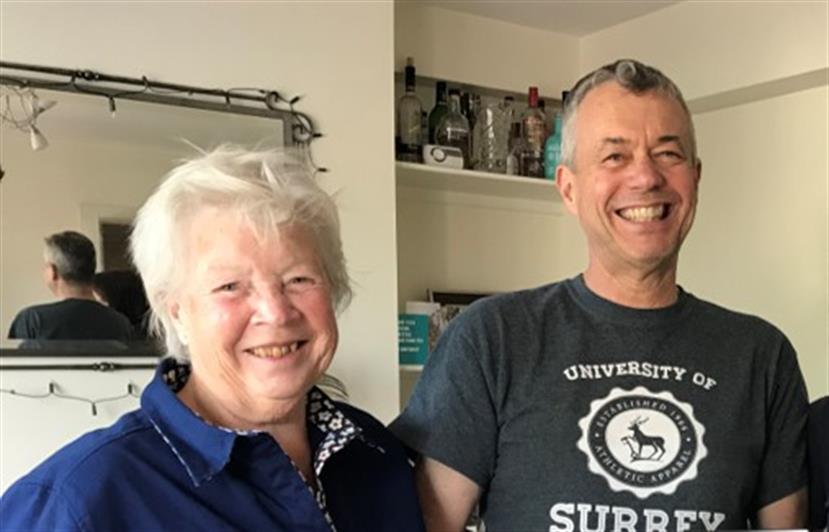
Image: Alan Cumber and his mum, Jean
Alan Cumber also recounts a passion for science being sparked when he was young. He remembers becoming “obsessed” with chemistry and how his mum encouraged him to pursue it further. Alan’s mum, Jean, had a Saturday job at the ICR in the late 1940s before Alan was born, cleaning fume cupboards and glass equipment, and running errands.
At the time, a new micro-analytics lab was being set up, and Jean was offered a job in the new lab.
Alongside this, she studied part-time for a chemistry qualification and was the only woman in her class. Jean enjoyed the job immensely, but was paid less than her male peers and, due to financial pressures, had to leave to look for another job.
Giving up work to raise a family
In the 1950s, Jean gave up work to raise her children. She retrained as a teacher when her sons were a bit older, studying part-time for a degree alongside raising Alan and his three younger brothers.
“We didn’t have a lot of money when I was growing up,” he said. “University wasn’t something that my family really considered, but my mum was a fierce, matriarchal figure in our family and she really pushed for me to go.”
After his degree, Alan weighed up his options, choosing between research and teaching. A careers advisor told him to try something for a year and see where it led. He got a job as a chemist working in cancer drug delivery in the ICR’s Chester Beatty Laboratories, and 47 years later, is still here at the ICR as Deputy Director of Facilities.
University wasn’t a possibility for some
Professor Chris Lord’s mum, Janice, was born in the 1940s and always wanted to be a botanist but she faced similar challenges to Jean.
“My mum grew up at a time where women from her socio-economic background didn’t have the opportunities to engage in research, or even go to university, that we have now,” Chris explained. “Even though she had the grades and was smart enough, university wasn’t a possibility.”
“Instead, she went to work at the Forestry Commission in a research laboratory. And when it came to having a family, working practices weren’t like they are now, with paid maternity leave and flexibility, so she had to give up work.”
When Janice’s sons were older, she got a job in a diagnostic microbiology lab in a hospital. Chris remembers the enthusiasm she had for her work.
“Hearing my mum talk about her work with such passion was really inspiring,” he said. “It definitely ingrained in me a desire to do a job that was useful and interesting. I remember learning about science at school and how she showed an immense amount of interest. As I progressed through university, to my PhD, through to now, she has always been massively interested in the work I do.”
Supportive mentors and supervisors
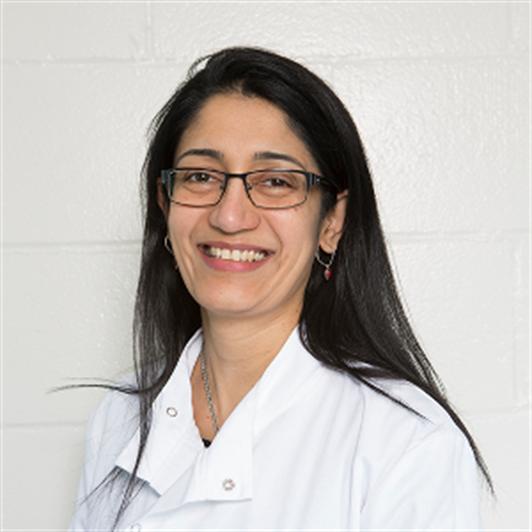
Image: Dr Navita Somaiah
Navita was similarly inspired by her mum’s passion for scientific research.
“Because of my mum’s influence, I wanted to have a research career,” she told me.
Now a Clinician Scientist and Team Leader at the ICR and an Honorary Consultant Clinical Oncologist in the Breast Unit at The Royal Marsden, Navita studied medicine at university, motivated by a desire to gain a deeper understanding of human biology.
“I took time out from my medical training to do a PhD at Oxford University. My supervisor asked me about my plans to have a family and by nature was very supportive saying that we should plan for that, if that was what I wanted.”
Part-time PhD is now a possibility
“At the time, part-time PhDs were not an option at Oxford, which of course unfairly penalised women. I ended up doing mine full-time, and had to juggle looking after a newborn with commuting back and forth daily from Oxford to London, it was challenging,” Navita said. “I’m lucky to have had a supportive family and supportive mentors and supervisors.”
Now that Navita is a supervisor herself, she actively discusses options with prospective candidates, should they wish to consider part-time PhD study as a possibility.
“So far I have supervised two part-time clinical PhD students and I want everybody to know, women especially, that it is possible to complete a PhD part-time. It certainly takes more organisation, but it is absolutely achievable and being a mother should not be a barrier to getting a doctorate.”
The value of flexible working
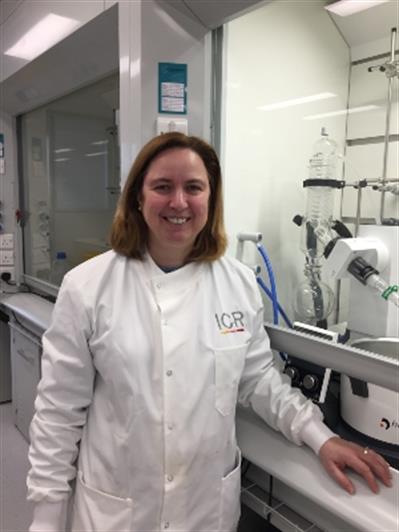
Image: Dr Tatiana McHardy
Dr Tatiana McHardy has also valued flexibility in her working life at the ICR. She studied chemistry at the University of Lisbon in Portugal, where the course was dominated by women, and this was starkly contrasted when she came to England and found the industry dominated by men.
“I remember when I first started at the ICR 18 years ago, there were so few women working in the chemistry department, and certainly nobody in the chemistry labs who had young children. I think being a mother does make things more challenging, you have more to juggle and it can take longer to progress.”
When Tatiana’s daughters, now 10 and 14, started school, she recalls finding it difficult to juggle school drop-offs and pick-ups with normal working hours.
“I was able to reduce my hours, and I think it made a real difference for me, having support from my team leader to work flexibly.”
A proud member of Athena SWAN
In 2019 the ICR was again awarded an Athena SWAN Silver award, which recognises the ICR’s efforts to create an open, diverse and inclusive working environment. It is used across the globe to support and transform gender equality within higher education and research.
Alan is a proud member of the ICR’s Athena SWAN Steering Group – working to improve equality across the organisation. Alan credits his “passion for natural justice” in part, to his mum.
“I grew up with three very strong women at the head of my family, and so I think that influenced my beliefs about equality. My mum is incredibly bright, but she left school early as was the norm for women in those days. Her passion and drive was so inspiring to me and I’m grateful to her for enabling me to pursue a science career when her own opportunities were so limited.
“Now I have two daughters of my own, and I feel very strongly that everybody should have equal opportunities, regardless of gender or race.”
Much to gain from increasing diversity
Chris is Deputy Head of the Division of Breast Cancer Research at the ICR and leads the Gene Function team.
“My family came to watch my inaugural lecture when I became a professor,” he said. “I think it meant a great deal to my mum.”
Chris reflects that, had her circumstances been different, his mum would almost certainly have been a degree educated scientist.
“I think this really encapsulates why it is so important to make sure that everybody who has the drive and talent to be a scientist can become one,” Chris said. He is also a member of the ICR’s Athena SWAN Steering Group.
“Barriers like wealth, gender, race and religion should not exist and this is much of what Athena SWAN is about. If we lack diversity, we all end up thinking in the same way and that is not healthy when what you’re doing is all about being creative and coming up with new ideas. We have so much to gain from increasing diversity in science and it is vitally important that we make sure things change for the better.”
Removing obstacles and smashing stereotypes
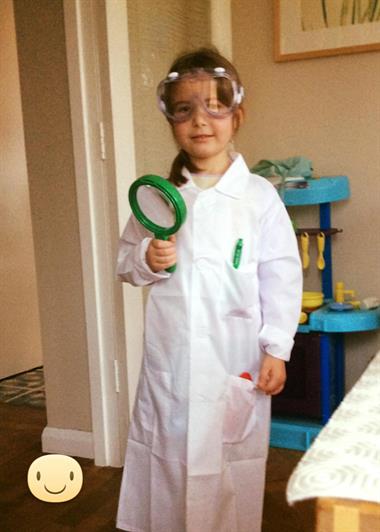
Image: Tatiana's younger daughter, Ines, dressed up as a scientist
Tatiana is a Senior Scientific Officer working in the Medicinal Chemistry team, and is also involved in Athena SWAN. Scientific Officers provide technical support for research teams – they often work across multiple projects and need a wide range of skills.
“I joined the Athena SWAN Steering Group because I felt it was important to represent the voice of the Scientific Officers, the majority of whom are women, and to be able to remove obstacles and help younger scientists maintain their place in science whilst raising a family.”
Tatiana’s daughters are both scientifically minded and attend science festivals and events with their mum.
“My younger daughter used to say ‘I want to be a scientist like my mum’,” Tatiana told me. “Now, she says she wants to be a midwife, and the older one is into physical sciences and maths, and wants to be a pilot.”
“I would never want them to feel as though they couldn’t pursue science because of their gender, but I think there is still a stereotypical view that scientists are men. I always try to motivate them to believe that they can do whatever they want to do in their careers.”
The importance of female role models
“There are still lots of industries that women are underrepresented in, and I think representation is very important,” Tatiana said. “I give careers talks in schools and I think sometimes just seeing me, as a woman, doing the job that I do, shows young girls that it is possible to be a woman and have a science career.”
Navita’s daughter, who is 12, doesn’t quite want to follow in the footsteps of her mum – she plans to become an astronaut.
“We went to hear Tim Peake speak at a Royal Society talk a while ago,” Navita said. “I was so pleased to see lots of the key scientists presenting were women. My daughter was really inspired by these women who were so passionate about their jobs, and she went home and researched the steps she’d need to take to become an astronaut.
“I really recognise the importance of female role models, and I’m pleased to see more and more women in science as time goes on. At the ICR and The Royal Marsden now, radiation oncology is very much female dominated and it’s great to see that the scales have tipped. I hope that when my daughter starts her career, she will have far more female role models to derive inspiration from.”
Future research leaders
There is undoubtedly still progress to be made. In the UK, just 28 per cent of professors are female, according to data published by the Higher Education Statistics Agency, despite near equal numbers of men and women working in academia more generally.
But with initiatives like Athena SWAN promoting and supporting the careers of female researchers, there is hope that the scales will continue to tip, and today’s talented female researchers will become future leaders in their fields.
We're training the cancer research leaders of the future through PhDs and fellowships - but we rely on our donors to help support them.
Find out more
comments powered by